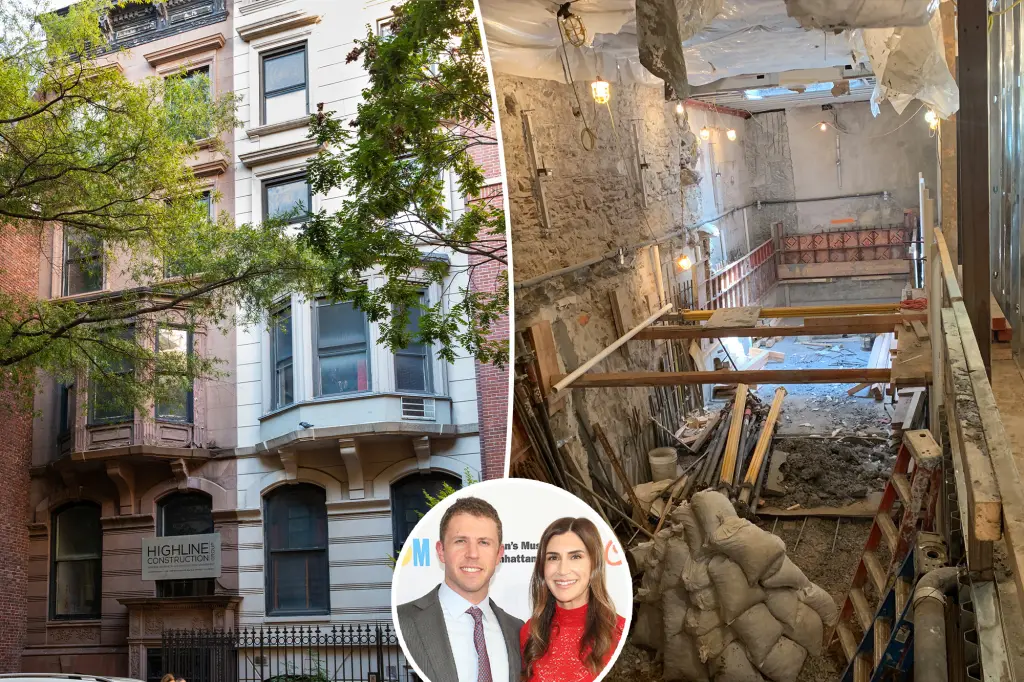
A moneyed Upper East Side family is looking to build an indoor pool in the cellar of their posh residence — but their neighbors aren’t exactly having a splash.
Plans are in place — but work hasn’t yet begun — to construct a private underground swimming pool on a tony block near Fifth Avenue. The owners of the double-wide townhouse at 15-17 E. 77th St., which they bought in May 2023 for $30 million, have filed plans to gut-renovate and expand their luxury lair — whose total dollar estimate is not available.
The next-door neighbors are trying to halt the pool part of the project, fearing that the extensive excavation necessary — nearly a year of jackhammering into the notoriously unyielding bedrock known as Manhattan schist — will cause irreparable harm to their health and home.
The law allows for a construction project to encroach upon an adjacent property — with proper protections, such as scaffolding and a licensing agreement for access. But after months of negotiations, the parties remain at loggerheads.
In August, the buyers aiming to construct the underground pool — Brittany Morgan, 37, a member of the family that owns Morgan Properties, one of the nation’s largest privately held apartment landlords, and her husband Zachary Kurz, 39, who runs a hedge fund — sued for access.
The neighbors are a doctor couple in their mid-70s. He’s an ophthalmologist and she’s a retired dermatologist. They bought their townhouse in 2003 for $5.22 million.
In September, the doctors countersued for “adverse possession,” since the construction would intrude upon a 1-foot slice of land of their rear yard, which they have decorated with plantings and pavers.
The project would also constitute a private nuisance, court papers say, upending the doctors’ lives and causing “irreparable injury” to an elderly man with breathing problems and to a home filled with valuable belongings.
“We implore your client to simply scale back its project,” wrote the doctors’ lawyer, David Peraino of Peraino Malinowski, to the other couple’s lawyer, Kevin Grande of Quinn McCabe. “Its desire to have an underground swimming pool is causing enormous inconvenience to its directly adjacent neighbors.”
Both lawyers declined The Post’s requests for comment.
Last fall, Morgan — who appears to share three kids with her husband — sent a cheery email to the elderly neighbors, as filed in court papers in Manhattan Supreme Court.
“It was so nice to get together at your beautiful home before and I want to give you an update on where we are and let you know the status thus far!” Morgan wrote.
“We understand the project will require license agreements and would like to set a meeting with our team to walk through the project scope and associated work that affects your property so that all is handled smoothly and efficiently for all! … I am so looking forward to joining the 77th block with you as such wonderful neighbors!”
That neighborly relationship soon took a nosedive.
A major concern is “quality of life issues,” according to the email sent by Peraino.
“My client has both asthma and lung nodules,” he wrote. “He is extremely concerned about the issue of dust caused by your client’s excavation and its effects on his health … Your client will be excavating through rock for nearly a full calendar year.”
Assorted plans filed in court show differing timelines. One says that the entire project — a combination of two townhouses that would also add an elevator — would last for 21 months. Another gives a timeline of three and a half years.
The doctors are further concerned about damage to their wine collection, their folk-art collection and a valuable chandelier, “the only other of which is located in the Lincoln Room in the White House,” according to court paperwork.
There are 168 items of artwork, plus glassware, light fixtures and antique furniture. Some objects have been promised to the American Folk Art Museum.
One suggestion for protecting the items from dust and vibration is temporary off-site storage, which would cost around $14,000 for the wine and $49,000 for the art. Another is to keep the items in the home, with certain protections.
In that case, the cost of post-construction cleaning, with labor at $400 an hour, would be between $157,000 and $204,000, according to a detailed estimate by an art-protection consultant, as included in court papers.
The parties further disagree on a licensing fee. Though some court paperwork mentions a licensing fee of $3,500 or $4,000 a month, the doctors also suggested a fee of $20,000 a month — more if the project runs over.
Those demands are “palpably unreasonable,” replied the pool couple’s lawyer, Grande. “The trivial inconvenience to respondent — placing a scaffold on its roof without impacting access to its property — warrants an appropriately modest licensing fee” of $500 a month.
But the disruption caused by the work itself is the real point of contention.
According to the construction monitoring plan, pool construction would require an excavation of “up to 24 feet below the existing rear yard elevation.” The equipment used could include “pile drilling rigs, conveyors, mini excavators, jackhammers, bobcats, concrete trucks, and similar equipment” operating during the work hours of 8 a.m. to 5 p.m. on weekdays. An additional 23 nearby addresses — across the street and through the block — should have exterior monitoring, according to the plan.
Any assertion that the project would be a trivial inconvenience “is a grievous misrepresentation of the facts,” the doctors wrote in a statement to The Post.
“We are not opposed to reasonable construction where neighbors consider the impact of their projects on the ability of their neighbors to peacefully enjoy their homes,” they wrote. “This project is excessive in scope given the neighbor’s desire to install a swimming pool in their basement, and has great impact on the integrity of our lives and our home.”
It is also unclear whether the doctors would need to temporarily relocate if air monitoring showed unsafe levels of particulates. The next-door couple are “blatantly disregarding” the health risks to their neighbors, Peraino wrote. An air monitoring consultant deemed the safety plan “to be deficient.”
Without access to the doctors’ property, “Petitioner will be unable to perform renovation and expansion of the existing buildings … which will leave the Project Premises undeveloped and will not benefit the community,” Grande wrote in court papers.
A subterranean pool “offers no benefit whatsoever to the community and only benefits one party … at the cost of every one of its neighbors,” Peraino replied.
Such below-ground pools in Manhattan townhouses are rare. The Department of Buildings keeps no count, because they require no separate building permit.
But Bob Blanda, owner of Mill Bergen Pools in Brooklyn, estimates there are about 50 such pools. His company has built at least 15 over the last eight years, he told The Post. One project was abandoned midstream.
Such disruptive work is extremely time-consuming and labor-intensive, Blanda said — and expensive.
“They have to underpin the foundations, which means they are bringing the foundations deeper into the ground and are touching the neighbors’ foundations, so a lawyer will get involved,” Blanda said.
As for that year of excavation? “They are drilling holes into the bedrock and they split the rock with a tool called a rock splitter,” Blanda said. The debris is then removed with conveyer belts and buckets, dumped into small wheelbarrows and hurled into a Dumpster outside.
The problem of parking adds to the cost. Blanda often needs an extra worker just to man the truck. The driver sits or circles, working around alternate-side parking rules.
“Sometimes you take two or three tickets a day,” Blanda said. “It’s a cost of doing business in Manhattan. Insurance is so much higher in Manhattan, too. We have to carry $5 million liability, which is five times the price to work in the boroughs.”
His company also offers maintenance service. “We clean these pools every week,” he said. “Most of these people have multiple homes in multiple locations. Usually a management company manages the house.”
John Dugan, president of American Pool in New York, whose company typically services commercial pools, is familiar with about 20 private underground pools in Manhattan townhouses.
In his experience, such pools get little use, he told The Post. “When the kids hit 12 or so, they don’t want to be home with their parents. They want to hang out with their friends.”



